★★½
“Daddy issues.”
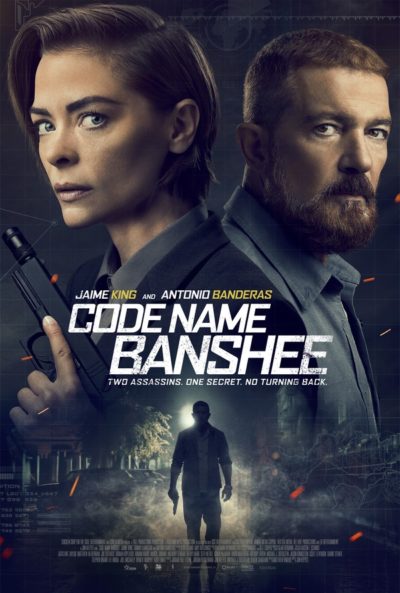 This seemed considerably better in the trailer, which makes it look like quite an action-packed extravaganza. The reality is much less interesting, with a murky and confusing plot, and what action there is, is often filmed in a murky and confusing way. It begins with an agent, code name Banshee (King), quitting the government agency for which she works. The handoff of an asset went wrong: one of the colleagues involved was her father, who vanished entirely. The other was Caleb (Banderas), who went off the grid thereafter. Five years later, Banshee is a private assassin, but her latest job is interrupted by Greene (Flanagan), who wants her to give up Caleb’s location.
This seemed considerably better in the trailer, which makes it look like quite an action-packed extravaganza. The reality is much less interesting, with a murky and confusing plot, and what action there is, is often filmed in a murky and confusing way. It begins with an agent, code name Banshee (King), quitting the government agency for which she works. The handoff of an asset went wrong: one of the colleagues involved was her father, who vanished entirely. The other was Caleb (Banderas), who went off the grid thereafter. Five years later, Banshee is a private assassin, but her latest job is interrupted by Greene (Flanagan), who wants her to give up Caleb’s location.
Naturally, she won’t, and tracks down Caleb herself to warn him and his teenage daughter, Hailey (Davis) – as well as, hopefully, find the truth out about what happened to her father. Before she can do so, Greene shows up, with an apparently infinite supply of minions, who appear remarkably oblivious to concepts such as “taking cover”. To get to this point, you will have to endure a script that doesn’t bother explaining almost any significant point. I’m not sure why Greene is suddenly and energetically going after Caleb, half a decade later. Or why Banshee also waited so long to visit the only man who knows what happened to her father. Then there’s the facile ease with which she is able to track down Caleb, based entirely on a fragmentary conversation from a long time previously. Mind you, running a bar is not exactly what I would call “going off-grid”…
It is a bit of a pity, since I liked most of the characters, and the actors do a fairly good job of bringing them to life. King and Davis have good chemistry, and Banderas brings an effective world weariness to his role, as a veteran who now just wants to be left alone. The highlight though, is likely Flanagan, who hits the right balance, creating a larger than life villain, without going too far into the chewing of scenery. The lack of apparent motivation – we never know who he’s working for, or why – does limit his effectiveness.
The first bit of action may be the best elevator lobby fight since The Matrix, and does a good job of establishing Banshee’s credentials, even if there isn’t much else of a similar standard the rest of the way. Indeed, as far as Banshee goes, there’s not much at all, until Greene’s curiously incompetent henchmen start to show up at Caleb’s house, attacking in small, conveniently handleable groups. For… reasons, it’s largely down to Banshee and Hailey to hold them off, the latter proving that the apple doesn’t fall far from the tree. So, two action heroines for the price of one. Yay. Just do not expect to learn the truth about what happened to dear old Dad, or you will be sadly disappointed. Actually, you may well be disappointed anyway…
Dir: Jon Keeyes
Star: Jaime King, Antonio Banderas, Tommy Flanagan, Catherine Davis





 A disease sweeps the planet, killing billions. The only ones with any hope of surviving in the outside world are the young, a small number of whom appear to have a natural immunity. Five years on, and Ellie is one of the few to have endured, scraping for a life among the leftovers of civilization. But she and the other survivors are the targets for the Stalkers: roaming groups of biohazard-suit clad hunters in white vans. They seek to capture the immune, for use in a project to develop a vaccine that can allow the elite to come out of their safe havens. While trying to avoid them, she encounters Quinn (Smith), another survivor with a wealth of knowledge, and a hard-edged approach to life. Initially, Quinn wants nothing to do with Ellie, though eventually realizes two heads can sometimes be better than one, in the never ending struggle to stay alive and free.
A disease sweeps the planet, killing billions. The only ones with any hope of surviving in the outside world are the young, a small number of whom appear to have a natural immunity. Five years on, and Ellie is one of the few to have endured, scraping for a life among the leftovers of civilization. But she and the other survivors are the targets for the Stalkers: roaming groups of biohazard-suit clad hunters in white vans. They seek to capture the immune, for use in a project to develop a vaccine that can allow the elite to come out of their safe havens. While trying to avoid them, she encounters Quinn (Smith), another survivor with a wealth of knowledge, and a hard-edged approach to life. Initially, Quinn wants nothing to do with Ellie, though eventually realizes two heads can sometimes be better than one, in the never ending struggle to stay alive and free.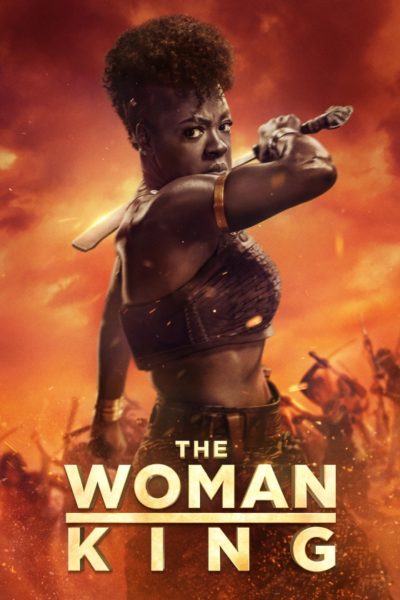 The above – though expressed rather more bluntly! – was Chris’s reaction to the opening scene, in which Nanisca (Davis) leads her female troops, the Agojie, in the ambush of slavers from the neighbouring Oyo tribe. The Oyo are rivals to the Kingdom of Dahomey, under King Ghezo (John Boyega), who relies on Nanisca and the Agojie to protect his territory, and it’s getting closer to all-out war. The Agojie get a new recruit, Nawi (Mbedu), whose father drops her off at the palace gate, because of her refusal to accept an arranged marriage. Nawi turns out to have a very close connection to Nanisca, but also ends up captured by the Oyo and needs to escape before being sold to Brazilian slavers.
The above – though expressed rather more bluntly! – was Chris’s reaction to the opening scene, in which Nanisca (Davis) leads her female troops, the Agojie, in the ambush of slavers from the neighbouring Oyo tribe. The Oyo are rivals to the Kingdom of Dahomey, under King Ghezo (John Boyega), who relies on Nanisca and the Agojie to protect his territory, and it’s getting closer to all-out war. The Agojie get a new recruit, Nawi (Mbedu), whose father drops her off at the palace gate, because of her refusal to accept an arranged marriage. Nawi turns out to have a very close connection to Nanisca, but also ends up captured by the Oyo and needs to escape before being sold to Brazilian slavers.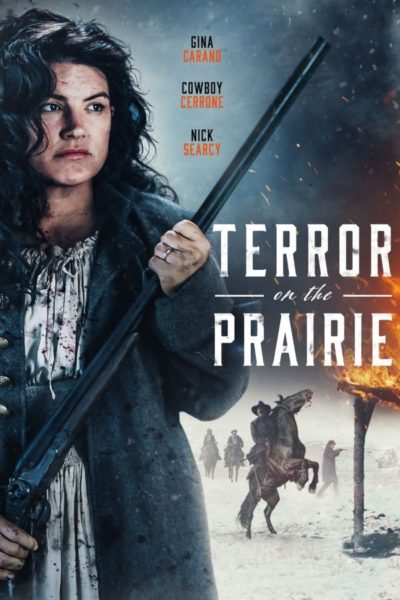 I keep hoping Carano will deliver an action film reaching the quality of her debut,
I keep hoping Carano will deliver an action film reaching the quality of her debut,  Joan is always a figure who has the potential to be co-opted into other times and locations. Recently, we reviewed
Joan is always a figure who has the potential to be co-opted into other times and locations. Recently, we reviewed 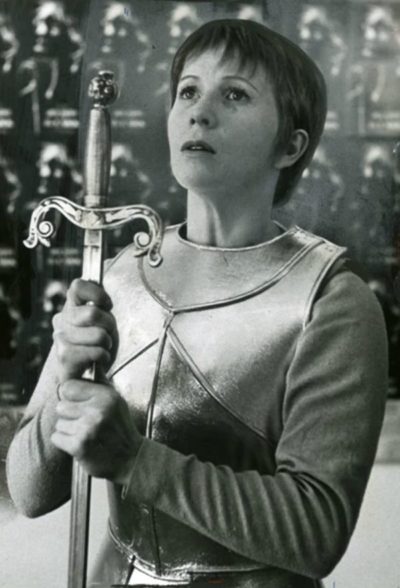 This was originally a French play, L’Alouette, written by Jean Anouilh in 1952. Three years later, a translated version was brought to Broadway, where it ran for 226 performances from November 1955 until June 1956. Julie Harris played Joan, and there was quite a star-studded cast behind her, including Boris Karloff as Bishop Cauchon, Christopher Plummer and Theodore Bikel. It was critically acclaimed, Harris winning that year’s Tony Award as Best Leading Actress, and Karloff being nominated as Best Leading Actor. The following February, a TV adaptation was screened in the United, though wasn’t the first or the last such. In November 1956, the BBC screened their version, with Hazel Penwarden as Joan, and a supporting cast including Michael Caine. Additionally, 1958 saw an Australian version, though it seems notable only for having Olivia Newton-John’s father in the cast.
This was originally a French play, L’Alouette, written by Jean Anouilh in 1952. Three years later, a translated version was brought to Broadway, where it ran for 226 performances from November 1955 until June 1956. Julie Harris played Joan, and there was quite a star-studded cast behind her, including Boris Karloff as Bishop Cauchon, Christopher Plummer and Theodore Bikel. It was critically acclaimed, Harris winning that year’s Tony Award as Best Leading Actress, and Karloff being nominated as Best Leading Actor. The following February, a TV adaptation was screened in the United, though wasn’t the first or the last such. In November 1956, the BBC screened their version, with Hazel Penwarden as Joan, and a supporting cast including Michael Caine. Additionally, 1958 saw an Australian version, though it seems notable only for having Olivia Newton-John’s father in the cast. I didn’t realize until this started, it was by the director of the (non-GWG)
I didn’t realize until this started, it was by the director of the (non-GWG)  Three generations of a family take a trip into the woods in their mobile home. There’s grandfather Stan (Ward), his somewhat neurotic daughter Helen (Ayer), whose life has been falling apart around her, and Helen’s teenage daughter, Emily (Spruell), for whom a weekend in a forest with old people is
Three generations of a family take a trip into the woods in their mobile home. There’s grandfather Stan (Ward), his somewhat neurotic daughter Helen (Ayer), whose life has been falling apart around her, and Helen’s teenage daughter, Emily (Spruell), for whom a weekend in a forest with old people is 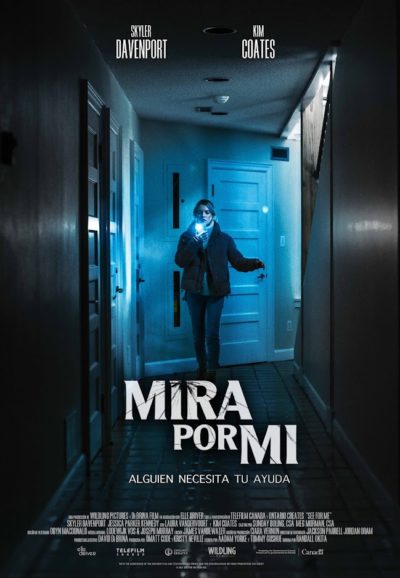 Yeah, as the above might suggest, this owes a rather large debt to
Yeah, as the above might suggest, this owes a rather large debt to 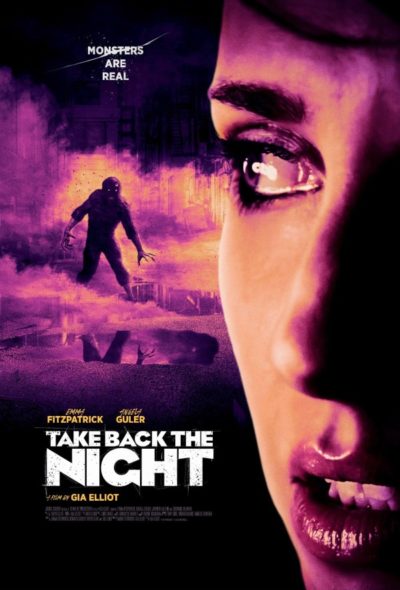 This is not exactly subtle in terms of its messaging, or the underling metaphor. But to be honest, I kinda respect that. I’d probably rather know what I’m in for, from the get-go, rather than experiencing a film which thinks it’s going to be “clever”, and pull a bait and switch. Here, even the title makes it obvious enough. The ‘monster’ here is sexual violence, and should you somehow make it through the film oblivious to that, you’ll get a set of crisis helplines before the end-credits role. However, it manages to do its job without becoming misanthropic, largely by having very few male speaking characters, and is adequately entertaining on its own merits, not letting the movie drown in the message.
This is not exactly subtle in terms of its messaging, or the underling metaphor. But to be honest, I kinda respect that. I’d probably rather know what I’m in for, from the get-go, rather than experiencing a film which thinks it’s going to be “clever”, and pull a bait and switch. Here, even the title makes it obvious enough. The ‘monster’ here is sexual violence, and should you somehow make it through the film oblivious to that, you’ll get a set of crisis helplines before the end-credits role. However, it manages to do its job without becoming misanthropic, largely by having very few male speaking characters, and is adequately entertaining on its own merits, not letting the movie drown in the message.